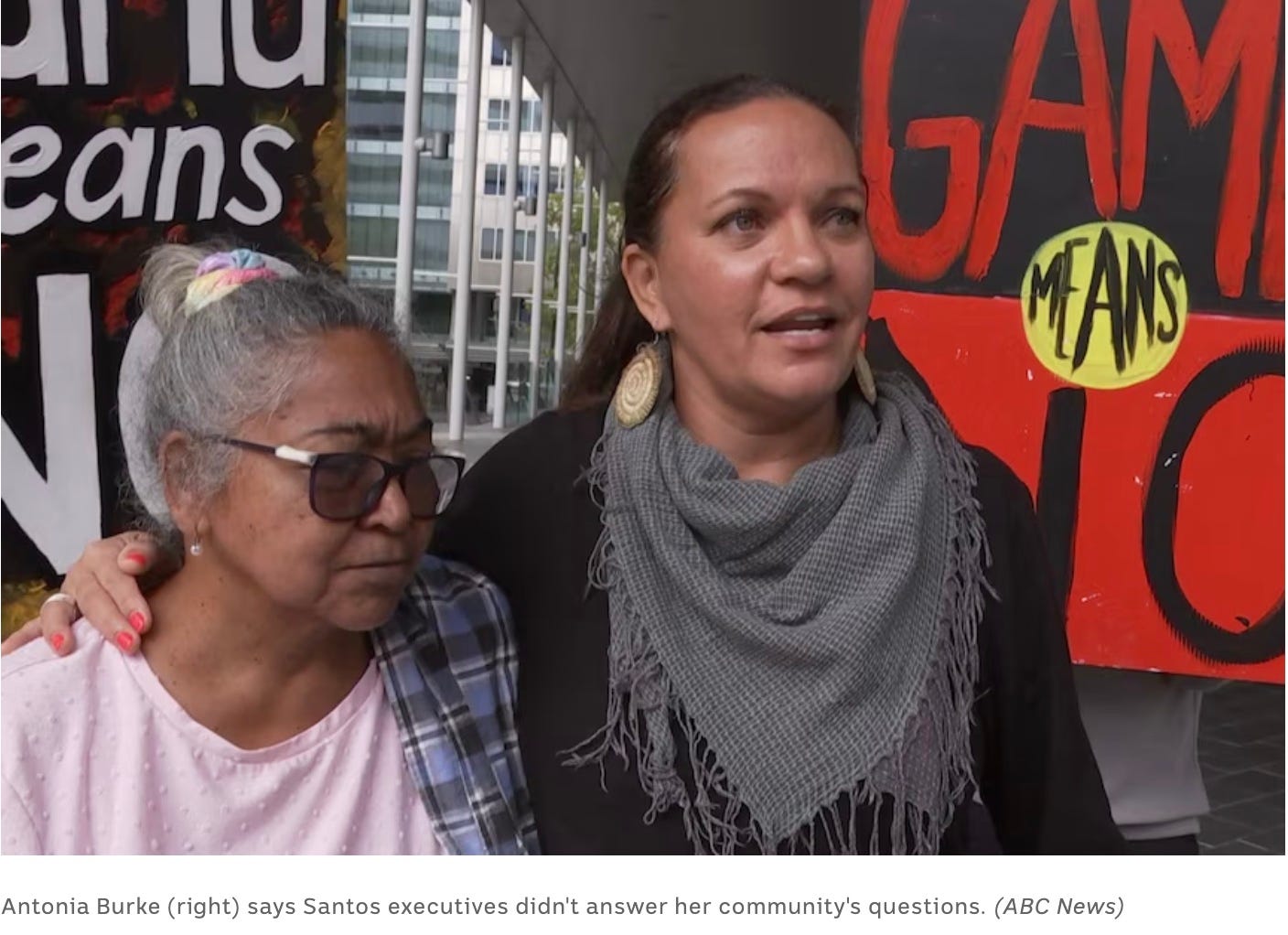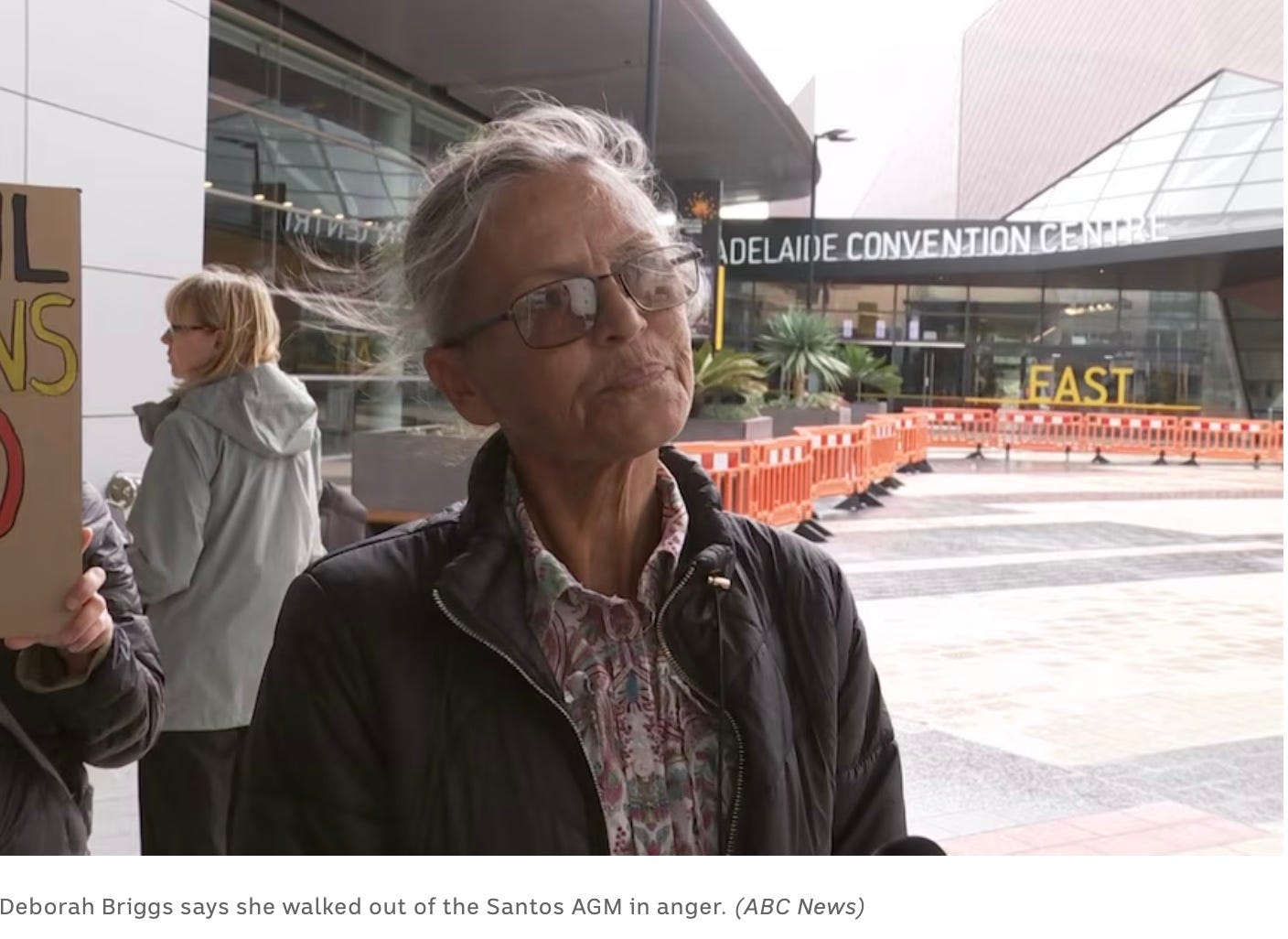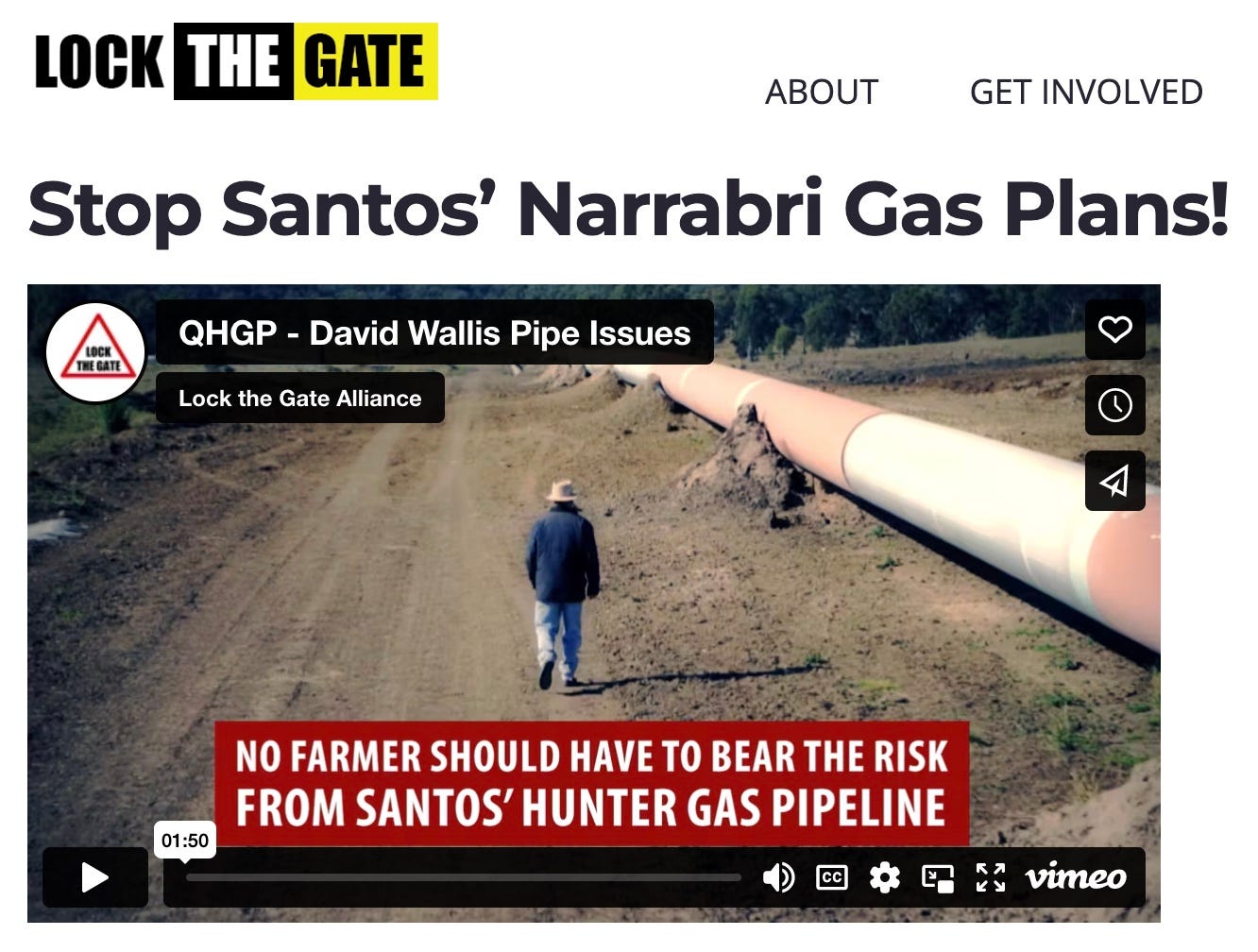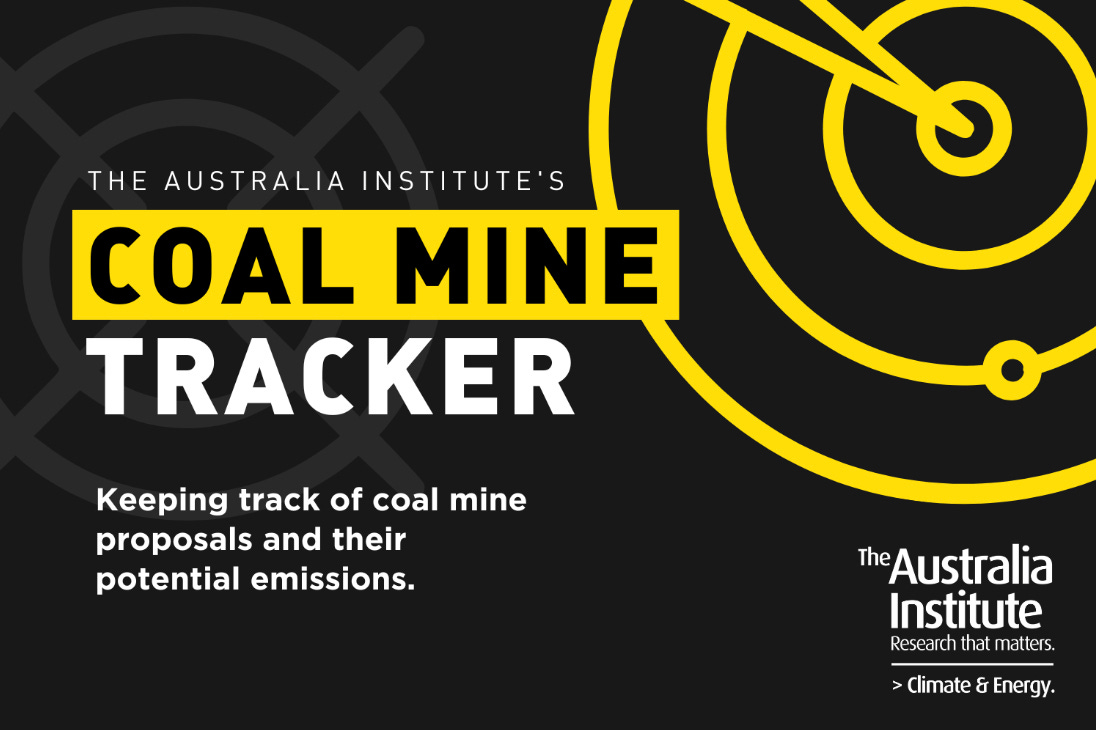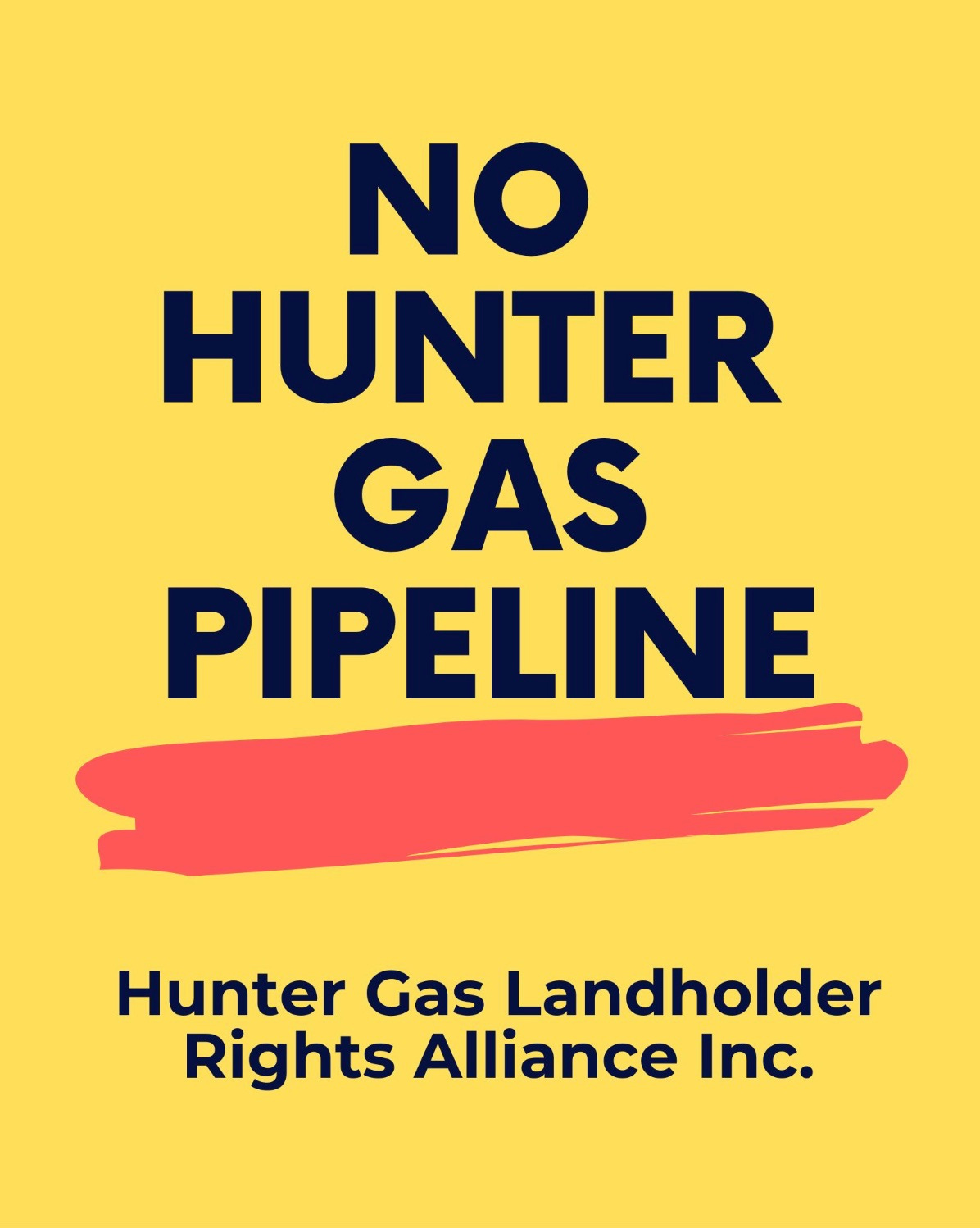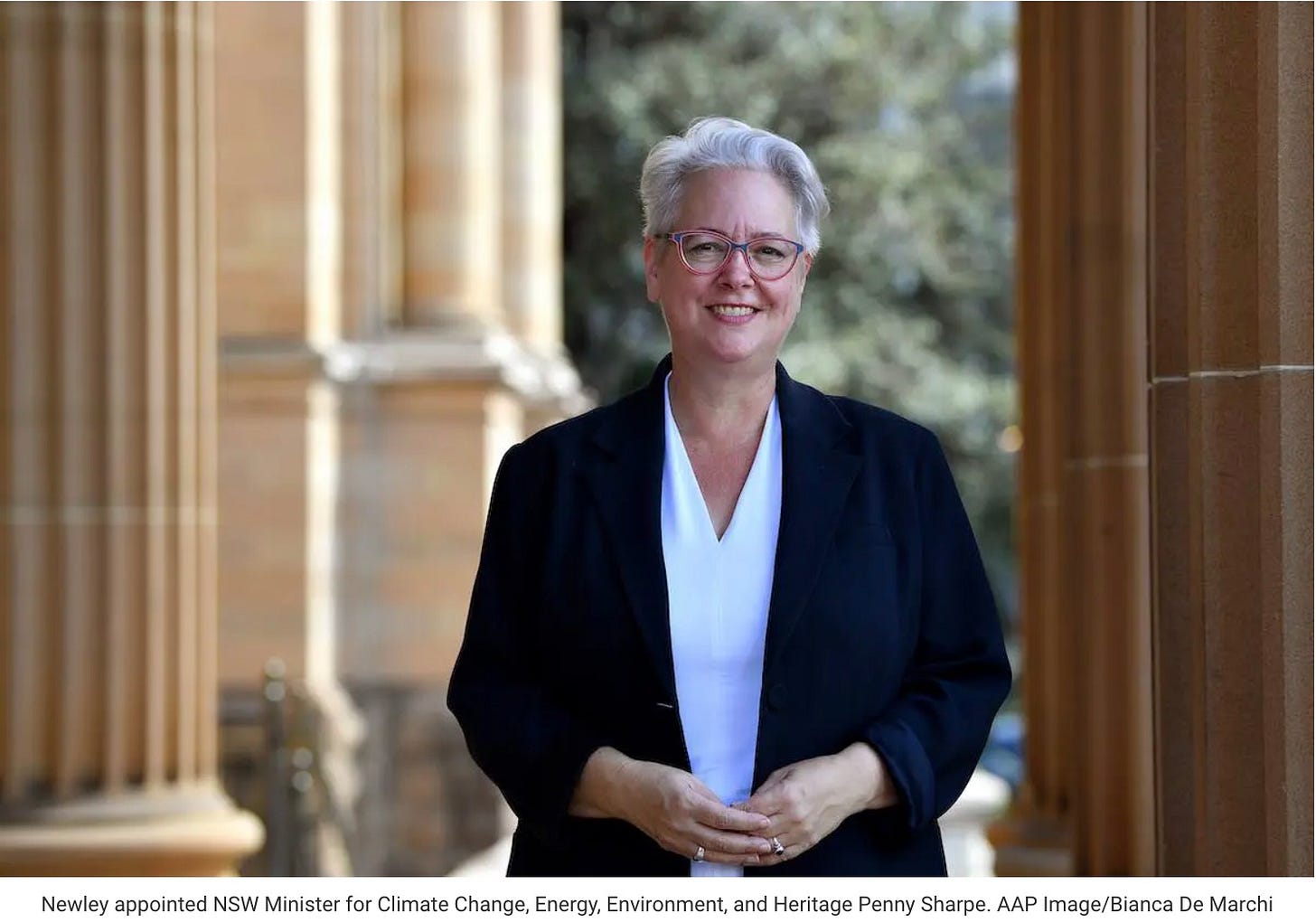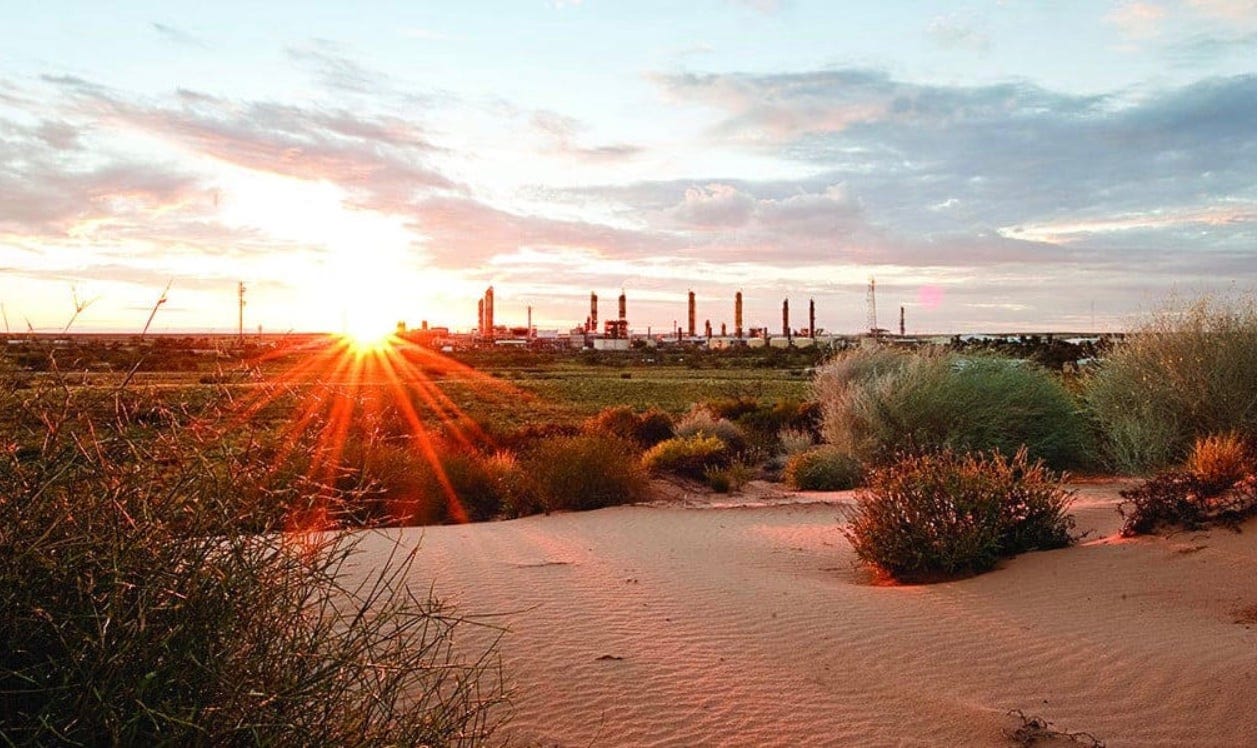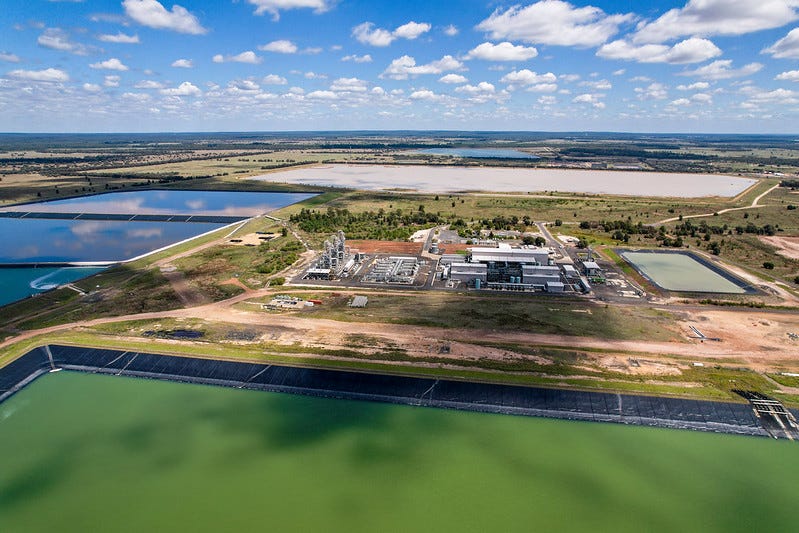Explosive Santos AGM; pipeline explosion in Cooper Basin leaves massive crater
And why the Hunter pipeline is a bad idea
Santos faces Traditional Owner ire, investor demands to manage down expansion plans
From Market Forces
More than 18% of Santos’ shareholders on April 6 demanded the company drop its oil and gas expansion plans and instead manage down production in line with a net zero emissions by 2050 pathway at the company’s annual general meeting (AGM) in Adelaide. The company also faced fierce scrutiny from Traditional Owners from the Tiwi Islands and Gomeroi Country (around Narrabri in NSW).
In a meeting where proceedings were not available to shareholders via webcast this year (as has been the case in previous years), Santos still found ways to try and stop voices from being heard even within the room itself. Yet this did not prevent investors from demonstrating dissatisfaction with Santos’ climate and corporate governance failures by voting against the board on key agenda items.
More than 10% of shareholders voted against the company’s remuneration report, which incentivises executives to pursue climate-wrecking oil and gas expansion in order to line their own hip pockets. Yasmin Allen, Guy Cowan, and Janine McArdle, members of the Santos board saw significant votes against their re-election at the meeting. This indicates growing shareholder concern about Santos’ strategy, which involves massive oil and gas production growth.
Working with more than 100 shareholders, Market Forces filed a statement against the company’s remuneration structure, as well as a shareholder resolution demanding information on how the company’s capital allocation to oil and gas assets will be managed down in line with a net zero by 2050 pathway.
Speaking after today’s AGM, Market Forces Asset Management Campaigner Will van de Pol said,
“Investors today delivered a significant rebuke to Santos after shareholders called out the company’s corporate governance and climate action failures.
“Almost one in five shareholders took the extraordinary step of voting against the Santos board, backing a shareholder resolution calling for oil and gas production to fall in line with agreed global climate goals.”
Failing strategy and leadership
Santos is pursuing a trajectory that clearly ignores all evidence and reason, and its board of directors is not only waving through these reckless fossil fuel expansion plans, but actually incentivising it with big executive bonuses.
Market Forces’ analysis indicates Santos’ massive oil and gas expansion strategy puts Santos on course to increase its overall emissions by 40% between 2022 and 2030.
The fact that Santos’ board continues to back such a misguided growth strategy shows the board is failing the company.
Santos showing no signs of slowing down on Narrabri and Barossa, despite significant Traditional Owner opposition
Santos also faced strident opposition from Traditional Owners that attended the meeting. Questions were raised about the significant risks and financial issues plaguing the embattled Barossa project, which continues to be resisted by communities on the Tiwi Islands.
Tiwi Islands Elders Mayor Pirrawayingi Puruntatameri, Councillor Therese Bourke, and Tiwi Representative Antonia Burke raised questions about the project, including Santos’s engagement with their community. The company declined to engage beyond providing evasive answers and turning off microphones in a bid to prevent Traditional Owners from expressing their concerns.
Gomeroi elders Deborah Briggs, Dorothy Tighe, and Donna Bartlett also voiced concerns about the Narrabri Gas project which they have been opposing for years. The Traditional Owners raised issues regarding Santos’ lack of fire preparedness, as well as expressed their continued opposition to the project and its impact on the environment and water of the Great Artesian Basin.
The executives and board did not respond adequately to the concerns raised by Traditional Owners, again choosing to silence these dissenting voices by turning off microphones and preventing concerns from being heard loudly and clearly by shareholders.
[Editor: More media coverage of the explosive AGM appears in the news section below.]
Petition against CSG in NSW launched
It’s now been confirmed that NSW Labor will not be able to form a majority government, but will govern in minority, relying on independents and the crossbench to have laws passed.
This means there will be more opportunities to pursue strong outcomes to protect land, water and communities from damaging coal and gas.
So we need to hit the ground running with this new Parliament.
Lock the Gate has launched a petition against coal seam gas in north-west NSW. They are aiming for 3,000 signatures. The petition will be presented to the incoming ministers.
Penny Sharpe MLC is the new Minister for Climate Change, Energy, Environment and Heritage. That means she will be making the decision on whether to grant a pipeline licence for the Hunter Gas Pipeline from Newcastle to Narrabri.
Paul Scully is the new Minister for Planning, which means he’ll be responsible for deciding whether the Narrabri Lateral Pipeline linking the Narrabri Gas Project to the Hunter Gas Pipeline will be approved.
"We don’t have any time to waste. On election night, Penny Sharpe repeatedly claimed the Narrabri Gas Project was approved and there was nothing the Labor Party could do to stop it," said Lock the Gate.
You can sign the petition here:
https://www.lockthegate.org.au/santos_narrabri?
Coalition approved CSG wells undercover during caretaker mode
NSW authorities quietly signed off on the reactivation of legacy coal seam gas wells in the Liverpool Plains during caretaker mode, despite sending an email to farmers on the same day, saying a decision would not be made until after the election.
Documents recently uploaded to a government website show approval was effective as of March 15 for Santos to reactivate the “Kahlua Pilot” wells, which are located 22 kilometres west from Gunnedah. Santos applied to reactivate the wells on January 12 this year.
Also on March 15, Mullaley Gas and Pipeline Accord member Margaret Fleck received an email from the Resources Regulator executive director stating: “As we are now in caretaker mode with the election these types of applications will not be finalised until after the election.”
Approval for Santos to reactivate these wells was also uploaded to an obscure section of the government’s website on March 31. Ordinarily, these decisions are uploaded to “News”, however this decision was uploaded to the document library.
The reactivation of the wells means Santos will now be able to use them to “explore” for gas, essentially meaning the company will be able to operate them as it would any other coal seam gas project including gas extraction and flaring. Nine million litres of waste water is expected to be produced from the wells each year.
The wastewater will be stored in two five million litre storage tanks, with Santos to eventually ship the waste water to its Leewood facility, near Narrabri.
Ms Fleck said it was a clear example of the government trying to hide the decision from the public.
“To be told on the same day approval was given that a decision wouldn’t be made until after the election is extremely poor form from the government and the bureaucracy."
Lock the Gate Alliance NSW coordinator Nic Clyde said, "We're renewing our call for the new Minns Government to stop Santos from developing its disastrous gasfield in the Pilliga Forest, and from laying waste to the NSW's farming powerhouse in the Liverpool Plains.
“The Minns Government should also urgently amend planning policies to put climate change considerations at the heart of any decisions and stop the approval of new coal and gas expansions.”
Tracking fossil fuel expansion
The Australia Institute has launched a coal mine tracker on its website.
Australia is the third largest exporter of fossil fuels in the world.
To avoid dangerous climate change, there can be no new coal mines or expansions of existing mines.
Instead of closing coal mines, the Federal Government is looking to open more.
There are 28 proposals for new or expanded coal mines currently waiting for Federal Government approval.
Approving even one new coal mine goes against our climate goals. Approving 28 new coal mines, and the 17.9 billion tonnes of emissions they would cause, is incompatible with limiting dangerous climate change.
If approved, the lifetime emissions from these mines would be equivalent to keeping all of Australia’s coal-fired power stations operating for an additional 129 years.
Coal mine tracker
Projects approved: 28
Total coal produced: 7,309 million tonnes
Total emissions: 17,896 million tonnes
The Federal Environment Minister, Tanya Plibersek, could say no to these projects.
https://australiainstitute.org.au/initiative/coal-mine-tracker/
Why the Hunter Gas Pipeline is a bad idea
From Sydney Knitting Nannas & Friends
Farms along the proposed 413km route of the Hunter Gas Pipeline produce cattle, grains, vegetables and fruit (some organic). This major gas infrastructure threatens all agricultural enterprises along the route and yet they have no protection from this toxic industry.
Santos, the owner of the Narrabri Gas Project and the Hunter Gas Pipeline, plans to expand into areas along the route in the areas where they have approval to explore for more coal seam gas.
[Editor's note: since this was published, Santos has admitted that a 63- terajoule per day subsurface gas pipeline connecting its Big Lake gas field to the Moomba processing facility blew up in January leaving a “massive” crater in the Cooper Basin. See news stories below.]
Hunter Gas Pipeline Route
The route of the 40m wide easement, cleared for the construction phase of the pipeline runs through –
• Farms creating biosecurity risks;
• Prime agricultural land on the Liverpool Plains which is leading to exploration for coal seam gas in the area;
• Soil types known for steel corrosion and movement;
• Many places where it will hit the water table if buried 900mm deep;
• Flood zones and flood/erosion prone areas;
• Hunter Valley Flood Mitigation Scheme infrastructure e.g levee banks;
• Koala and platypus habitat;
• The newly announced Mt Tangray Nature Reserve, splitting it in two;
• Areas where at least one local real estate agent has devalued land by 30% because of the pipeline.
Planning Flaws
The pipeline was approved using data from the original application from 2008 which even then was inaccurate and 10 years out of date. It is now 25 years out of date.
The Coalition government ticked the pipeline off in 2009 at the end of a process that included:
• A number of independent companies using old data to conduct desktop studies that were presented to NSW Department of Planning to support the Hunter Gas Pipeline and the selected route.
• The data downplayed the numbers of resident landholders, and local communities, who would be impacted by both the construction process and the operational phase of the pipeline;
• the risks of impact incidents to residents and workers, on rural and rural/residential lands
The route runs through land types and landforms that Hunter Gas Pipeline’s own risk assessments cautioned against.
Risks
The Hunter Gas Pipeline is a high pressure gas transmission pipeline which are:
• Not permitted to be built alongside major roads as they are considered to be too dangerous;
• Prone to being washed out, reappearing above ground. They are subsequently covered with rocks, permanently affecting productive land;
• Impacted by incidents due to normal farming/land management activities;
• Impacted by extreme weather events and soil movement – e.g. Due to flooding, a gas leak on APA’s Young-Lithgow Pipeline was detected on the 3 November 2022 where the pipeline runs underground beneath the Macquarie River. More heavy rain delayed access to the site. The gas was cut off to stop the leak and temporary gas supplies were made available to three towns. It was not until 19 December that the new permanent pipeline was completed.
Risks are not being managed in Santos’ other facilities
• Santos has been fined heavily, twice, and criticised by judges, the Unions and employees, for accidents on their Moomba Pipeline infrastructure (2001 – one employee dead. 2004 – 1 employee injured and 14 only avoided serious injury/death by seconds);
• In February 2023 days after a gas leak forced the closure of a Santos platform off the West Australian coast, the state’s safety regulator found 10 other platforms around Varanus Island were in a state of dangerous disrepair.
https://knittingnannas.org/2023/04/06/why-is-the-hunter-gas-pipeline-a-bad-idea/
The good oil on Murdoch's fossil fuel influence
By Eve Sinton
A sizzling 6,000-word Vanity Fair article bout the Murdoch family reveals the climate crisis-denying, oil-invested tycoon's power to get what he wanted from America's Trump administration.
Discussing Murdoch's alliance with Trump, writer Gabriel Sherman said Trump more than delivered.
"One source with direct knowledge of their conversations told me Murdoch lobbied Trump to punish Facebook and Google for siphoning his newspapers’ advertising revenue. In 2019, Trump’s Justice Department launched an antitrust investigation of Google. In 2021, Google settled and struck a lucrative content-sharing deal with Murdoch.
"The source also said Murdoch pushed Trump to open up land for fracking to boost the value of Murdoch’s fossil fuel investments. The Trump administration released nearly 13 million acres of federally controlled land to fracking companies.
"Murdoch, who sources say has become more pro-life in recent years, encouraged Trump to appoint judges who would overturn Roe v. Wade. 'Rupert wanted Trump’s Supreme Court justices in so they could make abortion illegal,' a source who spoke to Murdoch said. Murdoch’s alliance with Trump made Murdoch more powerful than ever but carried a personal cost.
"According to a source, Murdoch wanted to buy a house in Florida to be closer to Mar-a-Lago, but [his then wife Jerry] Hall refused. Hall told friends she was alarmed by Trump’s lack of qualifications or respect for the office. At a lunch shortly after the 2016 election, Hall asked Trump to reroute the Dakota Access Pipeline away from Native American reservations that were protesting the project. Trump responded by asking if she wanted to serve in his administration as head of the Bureau of Indian Affairs. 'It was horrible. I couldn’t wait to get away,' she later told friends."
The article also delivers juicy details of Murdoch's divorce from Jerry Hall and his brief engagement to Anne Lesley Smith. Apparently, her belief that Murdoch myrmidon Tucker Carlson is a messenger from God was too much for her 92-year-old fiancé.
Santos in the news 1-14 April, 2023
While Santos' AGM got media attention, the standout story in this edition is from Energy News Bulletin: Big explosion at Australia's Big Lake gas field leaves questions for Santos. It's one where you really must click through and read the whole story. Especially if you object to a pipeline near your property.
Santos executives speaking at the AGM pushed for government investment in CCS (carbon capture and storage), the expensive and, so far, ineffectual attempt to bury carbon emissions.
They also switched off the microphone to prevent Aboriginal and Tosses Strait Islander traditional owners from asking too many questions about the Narrabri and Barossa gasfields.
In the last fortnight we have summarised 16 stories comprising 11,180 words. There's a link to the full story at the end of each item.
• A print version of each edition of Focus on Santos can be found at
LNG producers face slide in value of exports, new forecasts show
Simon Evans, AFR, 03/04/2023
LNG producers face a significant slide in the value of their exports next year as they grapple with unprecedented government intervention, new official forecasts show.
The value of LNG exports is predicted to halve in five years to $45 billion in an uncertain global gas market which is expected to remain “tight and volatile” until the end of 2024.
The latest figures are contained in a quarterly report released today by the Industry Department, and show LNG exports from Australia hit a record of $27 billion in the three months to December 31. They were driven by elevated spot prices and high oil price-linked contract prices.
In the 12 months to June 30, export values from LNG are forecast to hit $91 billion, buoyed by record global energy prices and a lower Australian dollar. However, the report paints a more sober outlook, with export values projected to fall to $45 billion by 2028 as “global energy markets reorganise”.
The department said LNG exports in the three months ended December 31 were 46 per cent higher than the same time a year earlier.
The $91 billion in export value forecast in 2022-23 stems from high spot LNG and oil price-linked contract prices, and high LNG production. This is enabling Australia’s producers to sell more of their output at spot market prices.
But the department then warns those export values will “moderate considerably after FY2024-25, assuming global energy markets reorganise further in response to the fallout from Russia’s invasion of Ukraine”. They project the export values will fall to $57 billion in 2024-25, and then ratchet down further to $45 billion in 2027-28.
Critic of early Eraring coal closure named new energy minister in NSW
Giles Parkinson, Renew Economy, 04/04/2023
One of NSW Labor’s most strident critics of the early closure of the country’s biggest coal generator has been named as the state’s new energy minister.
Penny Sharpe was spokesperson for the environment and heritage before the election, and – now in government – takes on the added portfolios of energy and climate.
Sharpe was highly critical of the decision by Origin Energy to close Eraring, the country’s biggest coal plant at 2.8GW some years early in August, 2025.
“We pretty annoyed by it … coming off line too early,” Sharpe said on election night on ABC TV. “We are hitting a cliff, we can’t have the lights go off … we need industry to keep going.”
Sharpe will be the country’s second current female energy minister, along with Victoria’s Lily D’Ambrosio.
https://reneweconomy.com.au/critic-of-early-eraring-coal-closure-named-new-energy-minister-in-nsw/
Big explosion at Australia's Big Lake gas field leaves questions for Santos
Paul Hunt & Helen Clark, Energy News Bulletin, 05/04/2023
The Cooper Basin operation. Pic: Santos
A 63- terajoule per day subsurface gas pipeline connecting Santos’ Big Lake gas field to the Moomba processing facility blew up in January leaving a “massive” crater in the Cooper Basin.
The incident is another safety problem for the company after several incidents offshore Western Australia, and other issues, that have led activist investor groups to protest remuneration for top managers. Once such example is UK investment firm Snowcap which called for a halt to executive bonuses, in particular the $6 million one off payment to managing director Kevin Gallagher.
Santos confirmed the explosion to Energy News on Wednesday night after this publication approached it for comment.
"In January, a stress-related failure of the Big Lake pipeline resulted in the release of natural gas," a spokesperson told Energy News.
"The operations team acted quickly to immediately stop the release and prevent further inflows to the pipeline.
"Repairs were completed in around a week, and an additional fortnight of testing and inspections ensured the integrity of the entire pipeline."
However, sources speaking to Energy News were less measured.
"It's lucky [the explosion] wasn't under a school or near a town," one source said on condition of anonymity.
The "major" incident was also verified via the South Australian Department for Energy and Mining.
A spokesperson for the South Australian regulator said they were only able to confirm an "incident at a gas pipeline" associated with the Big Lake field, but would not provide further comment. They did confirm it was a Santos project involved, however.
The departmental spokesperson said a formal report was being prepared by Santos, but it was not expected for three months after the incident, and that details in the report would not be made public.
One source speaking to Energy News about the most recent series of events, called the incident that occured in January "massive."
Another source told Energy News the emissions could be "at scale" and cause "significant" problems to Santos' social licence and bonuses for staff based on the company's environmental performance.
A fourth source told Energy News implied the explosion was of such force that it could have caused a "catastrophic outcome".
In an annual report presentation for financial 2021, Beach Energy noted that Santos was undertaking inspections of the trunkline at Big Lake "to reduce the chance of further unplanned shutdowns."
An issue with the trunkline impacted gas production from the Cooper Basin during October that year, it said.
Much earlier on, a 2001 report to the South Australian government, Santos said it had identified deterioration at the Big Lake trunkline.
"The pipeline failed due to internal erosion downstream of the transition weld to the meter run riser," Santos' report said.
Two decades later, in 2020 another incident occurred at Big Lake. The Serious Incident Report Is not public, however Santos requested an extension to lodge reports to the South Australian department.
Offshore gas explorer presses its case with new NSW Labor government
Samantha Hutchinson, AFR, 05/04/2023
Asset Energy, which controls the tenement stretching from Newcastle to Wollongong known as PEP-11, is amping up its bid to continue exploring the site under a new NSW Government, which makes up one half of a joint decision-making panel with the federal government.
The company, which has controlled the PEP-11 permit for more than a decade, has been in limbo at the site since Scott Morrison killed off its exploration permit in 2021, in a controversial decision that was then overturned in the Federal Court in February.
As the company waits for its permit to return to the joint panel under the Minns government and federal Resources Minister Madeleine King, it has pointed to polling it commissioned in the region which indicates that about a third of the region are supportive of new gas resources in the area.
Liverpool Plains farmers say NSW Resources Regulator approved Santos exploration during caretaker mode
Tess Kelly, Glen Innes Examiner, 06/04/2023
"Where’s the trust?"
Farmers on the Liverpool Plains have been left feeling blindsided after a decision was made to approve coal seam gas exploration near Gunnedah.
Cattle farmer and Mullaley Gas and Pipeline Accord member Margaret Fleck said she was outraged to find out the NSW Resources Regulator had given the green light to energy giant Santos to reactivate legacy coal seam gas wells on the Liverpool Plains.
According to a letter obtained by the Leader, the regulator approved Santos' 'Kahlua Pilot Reactivation Project' effective as of March 15, when the government was in caretaker mode.
Ms Fleck said she received an email from the regulator's executive director on the same day stating with the government in caretaker mode, the period before an election where no significant new decisions, appointments or contractual commitments should be made, "these types of applications will not be finalised until after the election".
"It's an outrageous thing to inform a member of the public that it wouldn't happen, and then on the very same day this activity has been approved," Ms Fleck told the Leader.
The approved site is located 20 kilometres west of Gunnedah.
Mining giant Santos given approval to re-activate four coal seam gas wells in NSW
Lani Oataway, ABC, 06/04/2023
A north-west New South Wales farmer has called on the new state Labor government to stop coal seam gas exploration in the area after an approval was granted during the election caretaker period.
The NSW Resources Regulator gave the company permission to reactivate four existing wells at the Kahlua Pilot site on the Liverpool Plains, about 20 kilometres west of Gunnedah.
The Resources Regulator said the decision was routine business, but the caretaker conventions prevented it from publishing the details on its website until the end of the month.
Santos' website indicates it will continue exploration works there until late 2024 or early 2025 to "ensure the long-term energy security and affordability for the state".
These wells sit inside Petroleum Exploration Licence (PEL) 1 — which had expired, and was extended by the NSW government in 2021.
Gas growth plans attacked at Santos AGM
Angela Macdonald Smith & Simon Evans, AFR, 06/04/2023
Santos chairman Keith Spence and chief executive Kevin Gallagher faced a barrage of questions about controversial gas projects at a fiery annual shareholder meeting in Adelaide, but avoided a “second strike” against the board.
Activists outside the meeting protested against both the Narrabri coal seam gas project in NSW and the $5.8 billion Barossa project in the Timor Sea ... (paywalled.)
Tiwi And Gomeroi Challenge Santos At AGM
Many groups continue to pressure Santos to stop developing new fossil fuel projects.
CEO Kevin Gallagher – on a salary of $11 million per year plus bonuses – told the press that activists “have been very effective at creating a level of discomfort for governments to be seen to be supporting energy companies”.
Pressure from campaigners continued in Adelaide today – outside and inside the Santos annual general meeting.
The Wire was on the ground speaking with Tiwi Islands and Gomeroi representatives and environment lobby group Market Forces. (Audio.)
https://www.thewire.org.au/story/tiwi-and-gomeroi-challenge-santos-at-agm/
Here’s how lawyers can save us from the climate crisis
Emma Elsworthy, Crikey, 06/04/2023
A group of First Nations traditional owners have lodged a human rights complaint against the ANZ bank and 11 others for doling out a $1.5 billion loan for fossil fuel titan Santos’ offshore gas projects, in one of more than 120 cases worldwide and as Australia becomes the second most litigious place on earth for climate action.
ANZ pitched in for the equal-largest share of Santos’ loan — some $97 million — and pulled in banking counterparts Commonwealth Bank of Australia (CBA) and Japan’s largest bank, MUFG, which scored a $3.7 million bank fee payday each from the hefty transaction. Westpac, NAB, ING and Citigroup also received human rights complaints over the loan.
The traditional owners, six of whom are from the Tiwi Islands and one of whom is Larrakia, were fighting the Northern Territory’s Barossa project in the Federal Court when the loan was quietly finalised, arguing Santos did not consult Tiwi communities properly before launching the climate-averse project that could destroy their way of life.
That means there was no free, prior and informed consent given by First Nations communities for Barossa, a key human right for traditional owners. But ANZ boasts a human rights policy founded on the United Nations’ guiding principles for business and human rights that compels banks not to lend money to corporations if it will impact human rights.
In other words, the traditional owners are asking the bank to put its money where its mouth is.
But does climate litigation work when grassroots efforts go head to head with the country’s most resourced fossil fuel titans, or the government ministers who greenlight their behaviour? Yes, but perhaps not in the way you expect.
Vidhya Karnamadakala, of Equity Generation Lawyers, is representing the traditional owners who she said have a right to say no to fossil fuel projects: “ANZ must show its shareholders, customers and the community that its human rights commitments are not just window dressing.”
The firm also represented eight teenagers and an octogenarian nun in 2021 when they took then-environment minister Sussan Ley to court over her failure to enact a common law duty of care in protecting younger people against future harm from climate change.
Initially the group won the High Court case, but Ley successfully appealed and the full bench of the Federal Court overturned the judgment, with one judge ruling the protection of the public from personal injury caused by the effects of climate change was not a responsibility of the minister under Australia’s environment laws.
Climate activist Anjali Sharma, now 18, was one of those students and was wholly undeterred by the result of her gutsy case. She told Crikey she firmly believed “legal action is incredibly powerful and is becoming increasingly relevant in the climate fight”, adding: “We’re seeing monumental victories and novel cases globally.”
University of Canberra academic Cristy Clark, whose expertise is how human rights and the environment mesh, said “the rise in climate litigation is both a bad sign and a good thing”, and argued the sheer fact citizens were turning to the courts thanks to paltry environmental policy showed how far behind we really are.
“But there’s reason to be hopeful,” she said. “We have seen some recent high level ‘wins’ through this kind of litigation — such as the Waratah Coal case, which has effectively halted Clive Palmer’s mine in the Galilee Basin.
“Even where the case doesn’t win — as occurred with Sharma — litigation can provide a powerful platform to change the conversation around climate change and particularly around the government’s obligations to protect human rights from its effects through adequate mitigation and adaptation.”
Plus all publicity is good publicity when it comes to the climate fight. These big moments create public conversation that manifests at the ballot box, Clark said. Just look at the
In a statement, an ANZ spokesperson said it would “consider the matter in line with the processes under our human rights grievance mechanism”.
https://www.crikey.com.au/2023/04/06/anz-santos-barossa-gas-project-litigation/
Santos confirms Cooper Basin pipeline explosion, as protesters converge on company AGM
Eric Tlozek & Candice Prosser, ABC, 06/04/2023
Oil and gas company Santos has confirmed a pipeline in South Australia exploded in January, as Aboriginal traditional owners walked out of a heated Annual General Meeting (AGM) in Adelaide.
The South Australian Department for Energy and Mining (DEM) said it was notified about the incident, which occurred at the Big Lake gas field in the Cooper Basin on January 25.
Resources website Energy News Bulletin described it as a "major explosion", citing anonymous Santos managers and on-site workers.
The company said it could not tell how much gas had been released from the pipeline, which has a capacity of 60 million standard cubic feet per day.
"In January, a stress-related failure of the Big Lake pipeline resulted in the release of natural gas," a spokesperson said in a statement.
"The operations team acted quickly to immediately stop the release and prevent further inflows to the pipeline.
"Repairs were completed in around a week, and an additional fortnight of testing and inspections ensured the integrity of the entire pipeline."
Departmental correspondence shows there was another serious incident at Big Lake in 2020, but details of that were also not released.
Meanwhile, a group of First Nations people — including Gomeroi people from New South Wales and Tiwi Islanders — travelled to Adelaide for the Santos AGM to voice concerns about two of the company's developments.
Extinction Rebellion protesters who were gathered outside the Adelaide Convention Centre cheered and applauded the groups as they entered the meeting.
The question section of the AGM was largely dominated by the Indigenous representatives, who expressed anger at many of Santos gas projects, including the Barossa gas field north-west of Darwin and the Narrabri project in western New South Wales.
At one point the executives were asked what price they "put on genocide", and members of the group told them: "You are not welcome on our land".
Tiwi Islander Antonia Burke asked the executives about the Barossa gas project.
"They didn't answer any of our questions today, at all," she said.
"They don't answer our questions in the consultations that they do with us one-on-one on the Tiwi Islands, they don't answer any of our questions through our legal team, and they don't answer any of our questions at their own AGM."
Ms Burke said it was disrespectful that microphones were turned off to avoid further questioning, while Indigenous representatives were still on their feet attempting to address the executives.
Emerging elder Deborah Briggs travelled from the Narrabri community in New South Wales to attend the AGM.
She was one of the people who walked out of the meeting in anger.
"We walked out simply because we didn't feel safe in there, we didn't feel respected, they are lying to their shareholders, they are lying to the Gomeroi people, to the wider population," Ms Briggs told the ABC.
"I got half of my question out, they cut the microphone off, they did that will all of the Gomeroi delegates.
Ms Briggs said she felt the level of security at the meeting was "pretty ridiculous", saying she and other Gomeroi people got searched multiple times and were followed by security.
"They followed us literally to the toilet, so it didn't feel comfortable at all," she said.
Ms Briggs said she wanted to attend the meeting to "plead, beg, ask, and demand" of the shareholders to drop their shares and stop supporting Santos and to advise the company that she would continue to occupy and try to protect the Pilliga native forest, where Santos has been given the green light to drill gas wells.
"I'm going to continue to invite the wider population as well as Gomeroi people to come and stand with me under Gomeroi law," she said.
"I've travelled all the way to advise the Santos board members who do not listen to Gomeroi people."
Santos Managing Director Kevin Gallagher said he was confident the $4.7 billion Barossa gas project could still go ahead, despite reforms to Labor's climate change policy in the form of a "safeguard mechanism" to reduce emissions.
He played down concerns raised by shareholders during the meeting about any financial impact on the project.
Santos warns Australia is ‘falling behind’ in drive to bury emissions
Nick Toscano, SMH, 06/04/2023
Santos boss Kevin Gallagher says Australia is lagging other countries in subsidising projects to trap carbon emissions and bury them underground, which the oil and gas producer insists is crucial to ensuring tougher emissions targets do not drive up energy bills.
Santos is constructing its first carbon capture and storage project at South Australia’s Moomba gas plant, and is finalising its initial engineering and design on a project in depleted gas reservoirs in the Timor Sea.
The Bayu-Undan carbon capture and storage project is considered critical to lowering the carbon footprint of Santos’ proposed $5.8 billion Barossa gas project off the coast of northern Australia, which contains high levels of carbon dioxide.
Gallagher told investors on Thursday that carbon capture and storage should provide Santos with a competitive edge over time, but said Australia was falling behind other countries in “recognising the criticality of CCS”. The United States had so far committed more than $10 billion to developing and deploying the technology, and had made tax credits of up to $85 a tonne available, he said.
However, carbon capture and storage is strongly opposed by the Greens and environmentalists who argue it diverts focus from shifting the economy to cleaner energy, and fear it could be used to prolong the consumption of harmful fossil fuels.
Questions also remain about the technology functioning at scale (Chevron’s Gorgon carbon capture and storage plant in WA still operating at just one-third capacity after six years) and there are limitations to the benefits of using carbon capture and storage for LNG imports.
Only the carbon dioxide in the reservoir can be easily captured, while the far greater emissions from the gas burnt to power the giant plants that cool the gas to liquid are still vented to the atmosphere.
Investors are increasingly concerned that new projects could face diminishing returns and become uneconomic – or “stranded assets” – due to green technology advances, shifts in consumer preferences and sudden changes in government policy.
Activists outside Santos’ meeting in Adelaide protested against the company’s plans to develop the Narrabri coal-seam gas field in NSW and the offshore Barossa project.
Market Forces, a climate-focused activist group, said shareholders had delivered a “significant rebuke” at Santos’ meeting, with 10 per cent of investors voting against all three directors standing for re-election.
Almost one in five shareholders also defied the urging of the board and voted in favour of a shareholder resolution calling for oil and gas production to fall in line with global climate goals.
‘Power handed to Greens’: Santos CEO goes on attack
Angela Macdonald-Smith & Simon Evans, AFR, 06/04/2023
Santos chief executive Kevin Gallagher has laid into the Albanese government and the federal Coalition for “handing power to the Greens” in the final design of the safeguard mechanism, which he says has escalated sovereign risk in Australia for investors.
The comments came after a meeting where he and chairman Keith Spence faced a barrage of questions about controversial gas projects, including the Narrabri coal seam gas venture in NSW as well as the Barossa project.
Activists outside the meeting protested against both Narrabri and Barossa, which Santos argues are vital to help prevent energy shortages in NSW and the Asian region, respectively.
It came as environmental groups and some activist investors wage a campaign against the company and its growth plans, which spilled over to votes against the remuneration report and director re-elections.
However, all four key proxy advisers recommended investors support the board, and opposition to the remuneration report among proxy votes was a relatively modest 10.8 per cent. That ruled out any possibility of a second 25 per cent vote against the remuneration report, which would have triggered a vote to spill the board.
Santos’ plans for expansion were the focus of protests outside the AGM venue, where investors were met with about 50 demonstrators holding banners.
Mr Gallagher said on Thursday Australia was falling behind the United States and several other countries in recognising how critical CCS technology was to help ensure an “orderly” transition to net zero emissions.
He predicted that carbon capture and storage would soon become a compulsory part of all new oil and gas projects.
Safeguard mechanism tipped to spur carbon capture for fossil fuels
Mike Foley, SMH, 07/04/2023
Controversial carbon capture and storage projects are expected to get a boost from new safeguard mechanism laws that require the heaviest polluters to reduce emissions to help meet Australia’s legally binding climate targets.
Carbon capture and storage traps emissions released when gas is extracted or fossil fuels are burned for energy, and injects them underground. But the Greens and some climate action advocates say the technology prolongs the use of fossil fuels and delays investment in clean, renewable energy.
Global resources analyst Wood Mackenzie said the scheme would boost investor confidence in carbon capture and storage (CCS).
“Changes to the safeguard mechanism will have a direct impact on gas producers looking to develop CCS projects in Australia,” Wood Mackenzie research analyst Anna Forbes said.
“CCS’s route to a viable revenue stream is clearer and getting financial backing will potentially become easier.
“I suspect this policy will generate a proliferation of CCS projects in Australia because not only will [gas] producers need abatement solutions, but so will all the other big industrial and mining emitters subject to the mechanism.”
Gas giant Chevron gained approval in 2016 for its massive Gorgon gas plant in Western Australia on the condition it captures and stores underground 80 per cent of the pollution it generates when greenhouse gas leaks during extraction and from burning gas to fuel its processing plant. However, carbon capture and storage is still working at only about 30 per cent of its required capacity on that project.
Santos is set to start a carbon capture and storage project next year at its Moomba production hub in South Australia and is working on another in the Timor Sea that could reinject under the seabed emissions from its proposed Barossa gas project off Australia’s northern coast.
Santos chairman Keith Spence told shareholders on Thursday that carbon capture and storage was critical to Australia’s ability to achieve net-zero emissions and warned industry would struggle to develop large-scale projects like Barossa without government support.
Coal seam gas waste plan risks washing ‘5m tonnes of salt into the Murray-Darling Basin’
Khaled Al Khawaldeh, Guardian, 08/04/2023
Kenya processing plant and ponds. Pic: Lock the Gate
Local landholders and advocacy groups in southern Queensland have criticised the state government’s plans to store millions of tonnes of coal seam gas waste in lined landfills, saying it risks contaminating the Murray-Darlin Basin.
They have also questioned the integrity of the government’s long-awaited waste management action plan for coal seam gas brine, saying it relies on research from oil and gas lobby group the Australian Petroleum Production and Exploration Association (Appea) and the University of Queensland Centre for Natural Gas, whose donors include Arrow Energy, Australia Pacific LNGand Santos.
Brine generated by CSG production is now stored in dams. The report recommended that brine be crystallised and the resulting salt – which it said was expected to amount to 5m tonnes over the life of the industry – be disposed of in lined landfill sites in a process called encapsulation.
Prof Stuart Khan, a water management expert with the University of New South Wales, said the research the report relied on was consistent with the risks and limitations identified by himself and other researchers a decade ago, which included the potential contamination of nearby creeks and aquifers particularly in the event of flooding.
He said it was frustrating the government had not moved on the issue and had instead chosen to pursue the cheapest short-term option.
Khan said landfills required consistent management to ensure they did not break down and pollute the surrounding environment, making them unviable as a long-term solution.
“You have to accept that it’s not a long-term sustainable solution, and it’s ultimately going to break down,” he said. “There is no landfill lining that will last 500 years.
Miners’ secret weapon in NSW planning approval
Joe Aston, AFR, 11/04/2023
While Tennis Australia had the luxury of tearing up its lucrative partnership with Santos in January 2022 just 12 months into a multi-year deal, the oil and gas giant faces zero risk of being treated so cavalierly by the top brass at Rugby Australia.
The Santos logo now adorns the Wallabies jersey in international Tests and the shirts of both the NSW Waratahs and Queensland Reds in the Super Rugby.
This sponsorship has been thoughtfully executed by Santos [which] needs to cultivate farmers in the arc of its major projects.
That certainly explains the Santos Festival of Rugby in Narrabri, where the Waratahs and Reds face-off in a pre-season game each February, and also the company’s sponsorship of local team the Narrabri Blue Boars.
Santos has been accumulating approvals for its $3.6 billion Narrabri gas project for nine long years. Indeed, Eastern Star Gas (which Santos acquired in 2011) started exploring for coal seam gas in the Pilliga State Forest in the late 1990s. The NSW Independent Planning Commission (IPC) approved the project in 2020 after receiving more than 20,000 submissions against it.
https://www.afr.com/rear-window/miners-secret-weapon-in-nsw-planning-approval-20230411-p5czmc
PEP-11 and Santos' Hunter Gas Pipeline are among projects cited as necessary to stabilise energy grid
Matthew Kelly, Macleay Argus, 12/04/2023
A looming east coast gas shortage has reinvigorated support for two of the Hunter's most controversial energy projects - Santos' Hunter Gas Pipeline project and Asset Energy's PEP-11. (Paywalled.)
Santos apologises for using image of Aboriginal elder Major 'Moogy' Sumner in corporate video
Eric Tlozek & Daniel Keane, ABC, 14/04/2023
Oil and gas company Santos has apologised to an Adelaide Aboriginal elder, who asked for his image to be removed from its corporate materials in protest at the company's treatment of Indigenous people.
Kaurna and Ngarrindjeri elder Major "Moogy" Sumner has written to Santos chairman Keith Spence saying he did not give consent for his image to be used in a promotional video played at the company's heated Annual General Meeting in Adelaide on April 6.
"It is disrespectful that you refused to listen to or answer the questions of the Gomeroi people and Tiwi Islanders who came to the Santos AGM to express concerns about mining on their Country," Mr Sumner wrote.
"I call on you to apologise to the Gomeroi people and Tiwi Islanders for the dismissive way they were treated by your company at the AGM."
Santos has apologised to Mr Sumner and said it would remove his images from its website and communications material.
Mr Sumner, who ran as a Senate candidate for The Greens last year, also asked for a public apology for the use of his image, saying it was "not just dishonest" but "disrespectful".
"The image of me was on there — not just once, twice," Mr Sumner told the ABC.
"There was one of me with the words 'One Future' across my face, and then there was just one of me standing there doing a smoking ceremony.
"It's bloody cheeky of anyone to think that I would be in support of anything like this."
Some traditional owners opposed to the company's Barossa gas project north of Darwin and Narrabri gas project in western New South Wales walked out of the AGM after their microphones were turned off during questions.
Mr Sumner said he did not attend the Santos AGM, and was not made aware it was even on, but believed his image was used to falsely suggest the company's projects had the support of him and other Aboriginal elders.
"I'm known by a lot of people across this country and different parts of the world and if they say to people, 'Moogy agrees with it' — which I don't — then other people will say, 'Well it must be alright'," he said.
"But I don't agree with it, I don't agree with anything that's digging the Earth, that's putting these mines up, digging up sites, knocking forests down or whatever they're doing, just to get fossil fuels."


